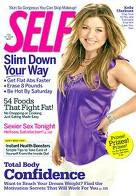
Kudos to the Royal College of Psychiatrists across the pond for taking on the thorny issue of media and body image in a powerful way.
The U.K. group just issued a statement admonishing the media for their damaging portrayal of eating disorders. That's good, and it goes along with similar statements made recently by several U. S. groups. Raising awareness on both sides of the pond--excellent work.
The RCC's gone a step further, though, calling for a "new editorial code" that would end the promotion of the unattainable thin ideal in the media. This is a bold step, and I'm going to be following developments closely on this subject.
The RCC identified three main areas of concern (and I'm quoting here from its press release, as you can no doubt tell from the Anglicized spelling):
Visual imagery: Preteen or underweight models are used by the media and advertising companies to promote a thin body ideal, and airbrushing and digital enhancement is widely used to portray physical perfection that is unattainable in real life.
Unbalanced articles : Many magazine articles give advice on dieting without giving information about the long-term effectiveness of diets and the dangers of extreme dieting. ‘Body critical’ articles also target celebrities for being overweight, underweight or physically imperfect, which normalises body criticism and can make people dissatisfied with their own bodies.
Inaccurate portrayal of eating disorders: Many articles ‘glamorise’ weight loss and portray eating disorders as mild disorders or personal weaknesses, rather than serious mental illnesses requiring specialist treatment.
I'm expecting cries of First Amendment foul on this side of the pond. It raises an interesting dilemma for me, as both a magazine journalist (and professor of magazine journalism) and an eating disorders advocate. Is censorship ever a good idea? How about self-censorship, which I think is what the British shrinks are suggesting?
My journalism colleagues will no doubt want to throw me off the island for saying this, but I'm all for some kind of self-censorship in this case. No journalistic standards will be violated if, for instance, magazines ran images of beautiful 20-year-old American models instead of emaciated Russian preteens with preternaturally pouty lips. In fact, I could argue that in the best possible tradition of journalism, magazines have a responsibility to tell both sides of the story: Instead of blaring the trumpets of weight loss at any cost, how about stories that encourage women to accept and love themselves as they are? I'm not even gonna mention the kind of cognitive dissonance that comes from Photoshopping the hell out of Kelly Clarkson on the cover and then running a feature quoting her as saying she loves her body the way it is and doesn't feel the need to diet herself into oblivion. I'm not even going to mention the magazine that did this (cough, rhymes with elf).
When I pitched a story on self-acceptance and body image recently to a magazine that shall not be named (cough, rhymes with wealth), I was told by my editor, rather sadly, that it would never fly.
Maybe when pigs grow wings.
**Thanks to one of my students, Courtney Egleston, for posting this story originally on the Newhouse magazine feed.